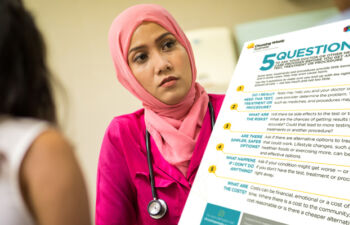Increasing numbers of young Australians are reporting psychological distress.
Open communication and a comprehensive psychosocial assessment are key for optimising the management of mental health issues for young Australians aged 16–24 years.
For health professionals
Key points
- For most adults living with a mental health disorder, symptoms started before the age of 24 years. This emphasises the importance of early diagnosis and management.
- Establish trust to facilitate open communication, which may inform a comprehensive psychosocial assessment and increase understanding of what is important to a young person when preparing individualised management options.
- Ask about suicidal thoughts regularly, and develop a safety plan. These are essential risk-management strategies when caring for young people with mental health issues.
- Support young people to use lifestyle and social management strategies as the foundation of management. Support should also be given to help them engage with psychological options that meet their needs and preferences.
- Consider trialling an SSRI when symptoms of depression and/or anxiety disorder are severe, or psychological treatment is not possible or not effective. Monitor for suicidal thoughts and behaviours after medicine initiation, particularly in young people.
Podcasts

- Episode 40: Mental health and young people - two personal stories
NPS MedicineWise medical advisor Dr Caroline West speaks with Nic Juniper and Rebecca Langman, two young people with lived experience with mental health.
Listen
- Episode 42: Exploring digital interventions for mental health
NPS MedicineWise medical advisor Dr Caroline West speaks with Dr Michael Millard, director of the clinical research unit for anxiety and depression at St. Vincent's Hospital. They discuss how early interventions with effective support, engagement and management can make all the difference to young people and their mental health.
Listen - Episode 44: Engaging with young people on their mental health
When it comes to young people's mental health, what can GPs do to make a real difference? How do you work together with someone to help them open up when they're depressed and withdrawn? How do you create time for mental health consults? How do you do safety planning and foster strengths and a sense of hope?
Listen - Episode 50: Mental health – building engagement with young Aboriginal and Torres Strait Islanders
In this episode, Dr Caroline West speaks with GP Registrar Dr Rebecca Davison, Nurse Jamie Maney and Sarah about ways to build engagement with young people with mental health issues in Aboriginal and Torres Strait Islander communities.
Listen
Listening to any of these podcasts can be recorded (in 30-minute increments) as self-directed CPD learning. RACGP members can use Quick Log to record this activity.


GP support videos and clinical resources
Effective conversations with young people about mental health issues. Dr Caroline West and Jahin a patient with a lived experience discuss the ins and outs in this series of shorts videos.

CPD options
- Online course: Talking mental health with young people: for pharmacists

Resources for your patients

Resources for Aboriginal and Torres Strait Islander people
-
iBobbly – A social and emotional wellbeing self-help app for young Aboriginal and Torres Strait Islander peoples aged 15 years and over.
-
About depression: What can help you heal?
-
What you need to know about your antidepressant
-
WellMob – Social, emotional and cultural wellbeing online resources for Aboriginal and Torres Strait Islander People

Research and references

Educational visits for GPs
Visits for this program will be completed by 30 November 2022, and no new bookings are being taken.
Educational visits focus on how to engage with young people to empower them and increase their autonomy, and support informed decision-making. The visit covers management options for depression and anxiety disorders in addition to engagement with young people about mental health issues.
Educational visits are a 30-minute one-on-one in-practice discussion; a virtual visit via video call; or a 1-hour small-group in-practice meeting for up to 10 health professionals. (Cost: Free)

Choosing Wisely Australia
Choosing Wisely Australia helps healthcare providers and consumers have important conversations about improving the quality of healthcare by reducing unnecessary and sometimes harmful tests, treatments, and procedures.
5 questions to ask your doctor or other healthcare provider is a resource that can help patients ensure they end up with the right amount of care.

Mental health and young people: Quality use of medicines briefing paper
This briefing paper provides key insights about mental health and young people, including the scale of the issue, clinical practice challenges and barriers to helping young people in psychological distress, and current programs and activities that are addressing the problem.
The aim of the briefing paper is to build momentum for shared action to address the mental health of young people.

